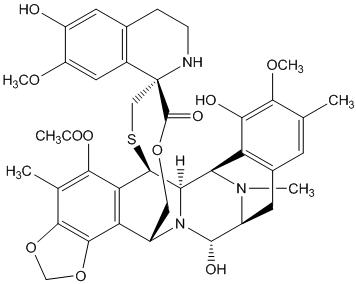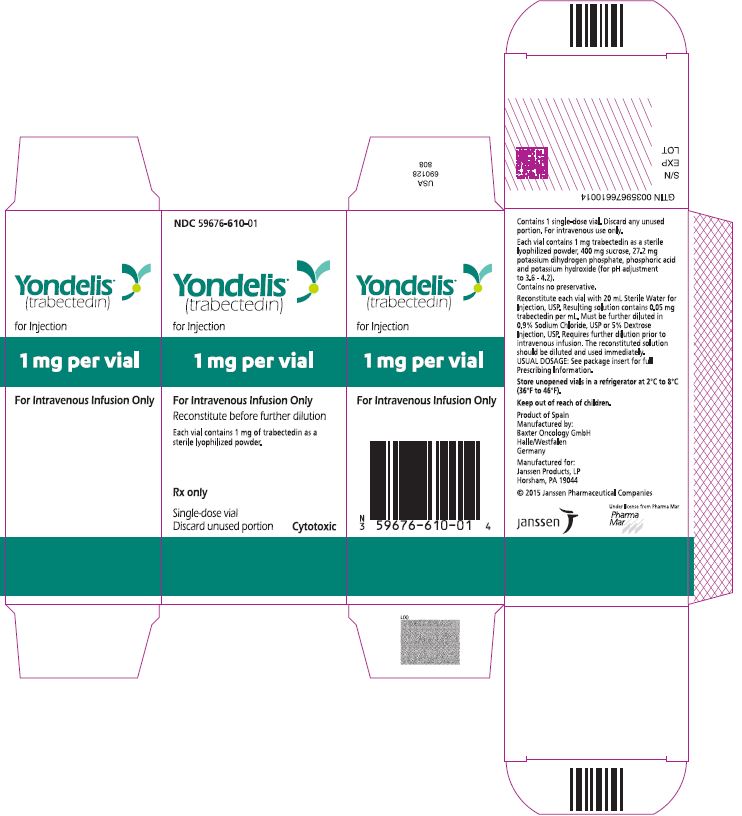Trabectedin
Generic name: trabectedin
Brand name: Yondelis
Dosage form: intravenous powder for injection (1 mg)
Drug class: Alkylating agents
Medically reviewed by A Ras MD.
What is trabectedin?
Trabectedin is a prescription medicine that is used to treat soft tissue sarcoma. Trabectedin may be given to you for other reasons.
Description
Trabectedin is an alkylating drug with the chemical name (1′R,6R,6aR,7R,13S,14S,16R)-5-(acetyloxy)-3′,4′,6,6a,7,13,14,16-octahydro-6′,8,14-trihydroxy-7′,9-dimethoxy-4,10,23-trimethyl-spiro[6,16-(epithiopropanoxymethano)-7,13-imino-12H-1,3-dioxolo[7,8]isoquino[3,2-b][3]benzazocine-20,1′(2′H)-isoquinolin]-19-one. The molecular formula is C39H43N3O11S. The molecular weight is 761.84 daltons. The chemical structure is shown below:

Trabectedin is hydrophobic and has a low solubility in water.
YONDELIS (trabectedin) for injection is supplied as a sterile lyophilized white to off-white powder/cake in a single-dose vial. Each single-dose vial contains 1 mg of trabectedin, 27.2 mg potassium dihydrogen phosphate, 400 mg sucrose, and phosphoric acid and potassium hydroxide (for pH adjustment to 3.6 – 4.2).
Mechanism of Action
Trabectedin is an alkylating drug that binds guanine residues in the minor groove of DNA, forming adducts and resulting in a bending of the DNA helix towards the major groove. Adduct formation triggers a cascade of events that can affect the subsequent activity of DNA binding proteins, including some transcription factors, and DNA repair pathways, resulting in perturbation of the cell cycle and eventual cell death.
Before taking trabectedin, tell your doctor:
- If you are allergic to trabectedin; any part of this medicine; or any other drugs, foods, or substances. Tell your doctor about the allergy and what signs you had.
- If you have liver disease or raised liver enzymes.
- If you take any drugs (prescription or OTC, natural products, vitamins) that must not be taken with trabectedin, like certain drugs that are used for HIV, infections, or seizures. There are many drugs that must not be taken with trabectedin.
- If you are taking St. John’s wort. Do not take St. John’s wort with trabectedin. This medicine may not work as well.
- If you are breast-feeding. Do not breast-feed while you take trabectedin.
This is not a list of all drugs or health problems that interact with trabectedin.
Tell your doctor and pharmacist about all of your drugs (prescription or OTC, natural products, vitamins) and health problems. You must check to make sure that it is safe for you to take trabectedin with all of your drugs and health problems. Do not start, stop, or change the dose of any drug without checking with your doctor.
What are some things I need to know or do while I take trabectedin?
- Tell all of your health care providers that you take trabectedin. This includes your doctors, nurses, pharmacists, and dentists.
- Have blood work checked as you have been told by the doctor. Talk with the doctor.
- You will need to have heart function tests while taking trabectedin. Talk with the doctor.
- Talk with your doctor before getting any vaccines. Use of some vaccines with trabectedin may either raise the chance of an infection or make the vaccine not work as well.
- You may have more chance of getting an infection. Wash hands often. Stay away from people with infections, colds, or flu.
- Low white blood cell counts have happened with drugs like this one. This may lead to a higher chance of infection. Rarely, infections have been deadly. Tell your doctor if you have ever had a low white blood cell count. Call your doctor right away if you have signs of infection like fever, chills, or sore throat.
- You may bleed more easily. Be careful and avoid injury. Use a soft toothbrush and an electric razor.
- Constipation, diarrhea, throwing up, and upset stomach are common with trabectedin. If these happen, talk with your doctor about ways to lower these side effects. Call your doctor right away if any of these effects bother you, do not go away, or get very bad.
- Capillary leak syndrome (CLS) is a very bad health problem that has happened with trabectedin. Sometimes, CLS can be deadly. Tell your doctor right away if you get signs of CLS like change in how much urine is passed; not able to pass urine; blood in the urine; a fast or abnormal heartbeat; chest pain or pressure; dizziness or passing out; shortness of breath; a big weight gain; swelling; throwing up blood or throw up that looks like coffee grounds; or if you have black, tarry, or bloody stools.
- If you are 65 or older, use trabectedin with care. You could have more side effects.
- If you are a man and have sex with a female who could get pregnant, protect her from pregnancy during treatment and for 5 months after your last dose.
- If you are a man and your sex partner gets pregnant within 5 months after your last dose, call your doctor right away.
- This medicine may affect fertility. Fertility problems may lead to not being able to get pregnant or father a child.
- This medicine may cause harm to the unborn baby if you take it while you are pregnant.
- If you are able to get pregnant, a pregnancy test will be done to show that you are NOT pregnant before starting trabectedin. Talk with your doctor.
- Use birth control that you can trust to prevent pregnancy while taking trabectedin and for at least 2 months after your last dose.
- If you get pregnant while taking trabectedin or within 2 months after your last dose, call your doctor right away.
How is trabectedin best taken?
Use trabectedin as ordered by your doctor. Read all information given to you. Follow all instructions closely.
- It is given as an infusion into a vein over a period of time.
- Other drugs may be given before trabectedin to help avoid side effects.
What do I do if I miss a dose?
- Call your doctor to find out what to do.
What are the side effects of trabectedin that I need to call my doctor about immediately?
WARNING/CAUTION: Even though it may be rare, some people may have very bad and sometimes deadly side effects when taking a drug. Tell your doctor or get medical help right away if you have any of the following signs or symptoms that may be related to a very bad side effect:
- Signs of an allergic reaction, like rash; hives; itching; red, swollen, blistered, or peeling skin with or without fever; wheezing; tightness in the chest or throat; trouble breathing, swallowing, or talking; unusual hoarseness; or swelling of the mouth, face, lips, tongue, or throat.
- Signs of infection like fever, chills, very bad sore throat, ear or sinus pain, cough, more sputum or change in color of sputum, pain with passing urine, mouth sores, or wound that will not heal.
- Signs of liver problems like dark urine, feeling tired, not hungry, upset stomach or stomach pain, light-colored stools, throwing up, or yellow skin or eyes.
- Not able to focus.
- Feeling confused.
- Feeling very tired or weak.
- Any unexplained bruising or bleeding.
- Pale skin.
- Dizziness or passing out.
- Swelling.
- A certain muscle problem (rhabdomyolysis) has happened with trabectedin. Rarely, this has led to organ problems and death. Call your doctor right away if you have muscle pain or weakness.
- Heart problems like heart failure have happened in people taking trabectedin. Sometimes, this has been deadly. Call your doctor right away if you have chest pain or pressure, a heartbeat that does not feel normal, shortness of breath, a big weight gain, or swelling in the arms or legs.
- This medicine may cause tissue damage if the drug leaks from the vein. Tell your nurse if you have any redness, burning, pain, swelling, blisters, skin sores, or leaking of fluid where the drug is going into your body.
What are some other side effects of trabectedin?
All drugs may cause side effects. However, many people have no side effects or only have minor side effects. Call your doctor or get medical help if any of these side effects or any other side effects bother you or do not go away:
- Feeling tired or weak.
- Headache.
- Not hungry.
- Joint pain.
- Trouble sleeping.
These are not all of the side effects that may occur. If you have questions about side effects, call your doctor. Call your doctor for medical advice about side effects.
You may report side effects to the FDA at 1-800-332-1088. You may also report side effects at https://www.fda.gov/medwatch.
If overdose is suspected:
If you think there has been an overdose, call your poison control center or get medical care right away. Be ready to tell or show what was taken, how much, and when it happened.
How do I store and/or throw out trabectedin?
- If you need to store trabectedin at home, talk with your doctor, nurse, or pharmacist about how to store it.
Label
PRINCIPAL DISPLAY PANEL – 1 VIAL CARTON
- NDC 59676-610-01
- Yondelis®
(trabectedin) - for Injection
- 1 mg per vial
- For Intravenous Infusion Only
- Reconstitute before further dilution
- Each vial contains 1 mg of trabectedin as a
sterile lyophilized powder. - Rx only
- Single-dose vial
Discard any unused portion - Cytotoxic

SRC: NLM .
